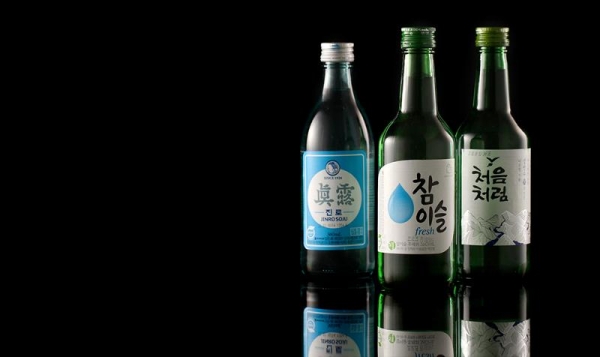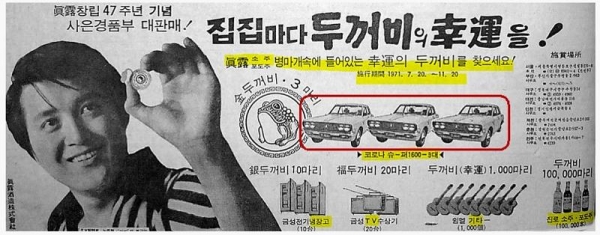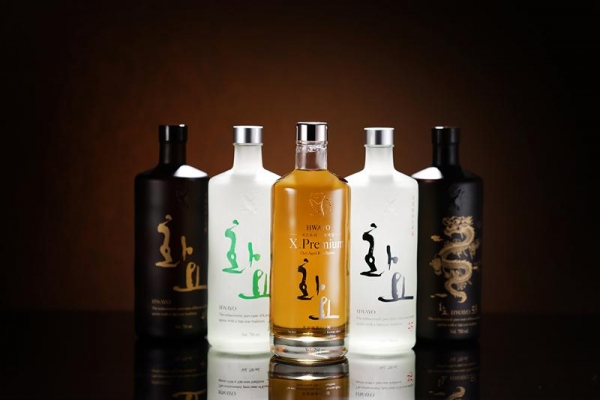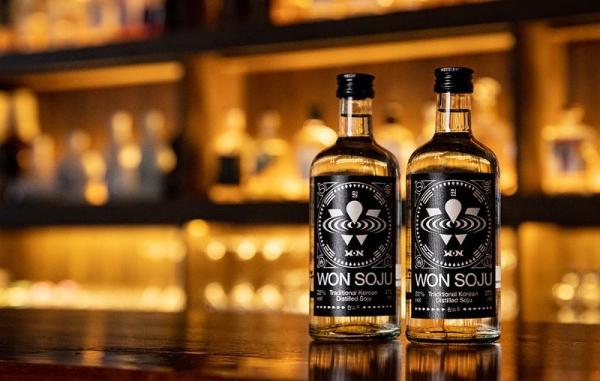

The protagonist Park Saeroyi in the internationally popular K-drama "Itaewon Class" sells a green bottle at his pojangmacha, a tent-style food kiosk on the street. That bottle contains an alcoholic beverage that frequently appears in Korean movies and series and is dubbed the liquor of the masses.
That drink is the country's most popular alcoholic drink: soju.
Mostly coming in 360 ml bottles, this drink is loved by all generations of Koreans as it gets people drunk fast without a heavy hangover for the low price of KRW 2,000 per bottle. It also goes great with many foods such as samgyeopsal (grilled pork belly) and sashimi while creating a savory combination with beer and other sodas.
The National Tax Statistical Yearbook said domestic sales of diluted soju last year reached KRW 3.7 trillion, making it the nation's No. 1 alcoholic drink with a market share of 42.1%.

The well-known soju in a green bottle is the diluted type containing alcohol extracted from ingredients like sweet potatoes, molasses and tapioca. This type is cheaper and easier for mass production than the distilled version, with a clean taste that has no scent and with other items that can add flavor other than alcohol extracted in the manufacturing process. Instead, additives to ease bitterness and soften the taste create sweetness in the final sip.
Diluted soju started to gain popularity from 1965, when the government banned the distilled type made of grain due to food shortages. Among soju brands like Chamisul, Chum-Churum and Good Day, Jinro, founded in 1924, has the longest history. Known for its familiar toad trademark, the company dominated the market from 1975 by producing more than a million cases of the drink a year on average, accounting for 42% of domestic soju production.
Jinro remained the national leader until Chamisul took over in 1998. Reflecting the rising popularity of retro culture, the "Jinro is back" theme debuted in 2019 and reflected a design indicative of the 1970s.

Diluted soju's alcohol content by volume (ABV) steadily decreased from 30% in 1965 to 23% in 1999 and 20% in 2006. Today, the figure is as low as 15%. A lower ABV raises sweetness and reduces bitterness in taste.
Fruit-flavored soju, which includes the scents of and concentrates from fruits such as citron, grapefruit and green grape, is also gaining popularity since its debut in 2015. In the past, a higher ABV was more popular, but the more recent trend is drinks with a lower rate that go well with food.
istilled soju has a taste and scent different from its unscented diluted cousin. Compared to the more popular diluted kind, the distilled version is more expensive. The brand Hwayo holds the highest market share for distilled soju. Unlike the diluted kind, the distilled edition uses only domestic rice and clean water collected from a bedrock layer 150 m below ground level. The process of fermentation, distillation and aging also gives the beverage its rich flavor.
On July 4, Korea.net visited Hwayo Co.'s plant in Icheon, Gyeonggi-do Province, and was immediately impressed with the scent that filled up the space. From the entrance, the smell of fermented and aged rice struck immediately and grew stronger near the ripening room. The onggi (earthenware storage containers) were as tall as the average person and classical music was softly playing in the background.
Park Jun Sung, general manager of the company's Production Department, said, "We make various attempts to make our alcohol Hwayo taste good," adding, "One of them is to play good music."

On the manufacturing process, he said, "After fermenting using pure microorganisms, we distill with a 'decompressed distillation' method that reduces pressure to boil at a low temperature to remove the smell and enhance the rice's unique flavor through a three-month aging process for earthenware."
The ABV rate varies from 17%-53%, and select whiskey products are aged in a barrel instead of earthenware. Hwayo soju can be consumed in highballs and cocktails through the addition of fruit and extra drinks, with the company's exports going to 22 countries including the U.S., the U.K. and France.

Unlike the high quality of Hwayo's drinks, another distilled soju brand has prioritized appealing to the masses: Won Soju. This company uses the concepts of Korean and non-Korean alcohol. Distilled by fermenting the rice brand Tootomi from Wonju, Gangwon-do Province, this type is made by Won Spirit, a liquor-producing company led by Korean American hip-hop artist Jay Park. Won Soju's distinctive design, relatively low ABV rate of 22% and cheaper price of KRW 14,900 per 375 ml bottle have attracted younger drinkers.
In February this year, the company's initial stock of 20,000 units at two pop-up stores were all quickly snapped up, and since March 31, the brand has sold limited quantities online. The drink's unavailability at offline stores has led to a shortage.
The company's new product Won Soju Spirits, which has an ABV figure two percentage points higher than its predecessor, has been sold exclusively since July 12 at the convenience store chain GS25 and the supermarket chain GS The Fresh. The new drink's initial stock of 200,000 bottles on July 18 was sold out in just a week.
Jay Kim, chief communications officer at Won Spirits, said, "Won Soju was initially produced for export to promote the appeal of traditional Korean liquor," adding, "Its clean base makes it perfect to add to cocktails."
The company added that it has received sales inquiries from about 60 countries and plans to reach consumers worldwide through onsite customized marketing.
The popularity of distilled soju reflects consumer demand for high-end liquor and a transition in drinking culture.
"As consumption patterns change in reflecting higher incomes, a variety of premium liquor and alcoholic beverages are being released," said Kim Tae Wan, a principal research scientist at the Korea Food Research Institute's Traditional Food Research Group. "Soju demand is expanding from cheap and simple flavored diluted kinds represented by green bottles to expensive versions with more flavor."


